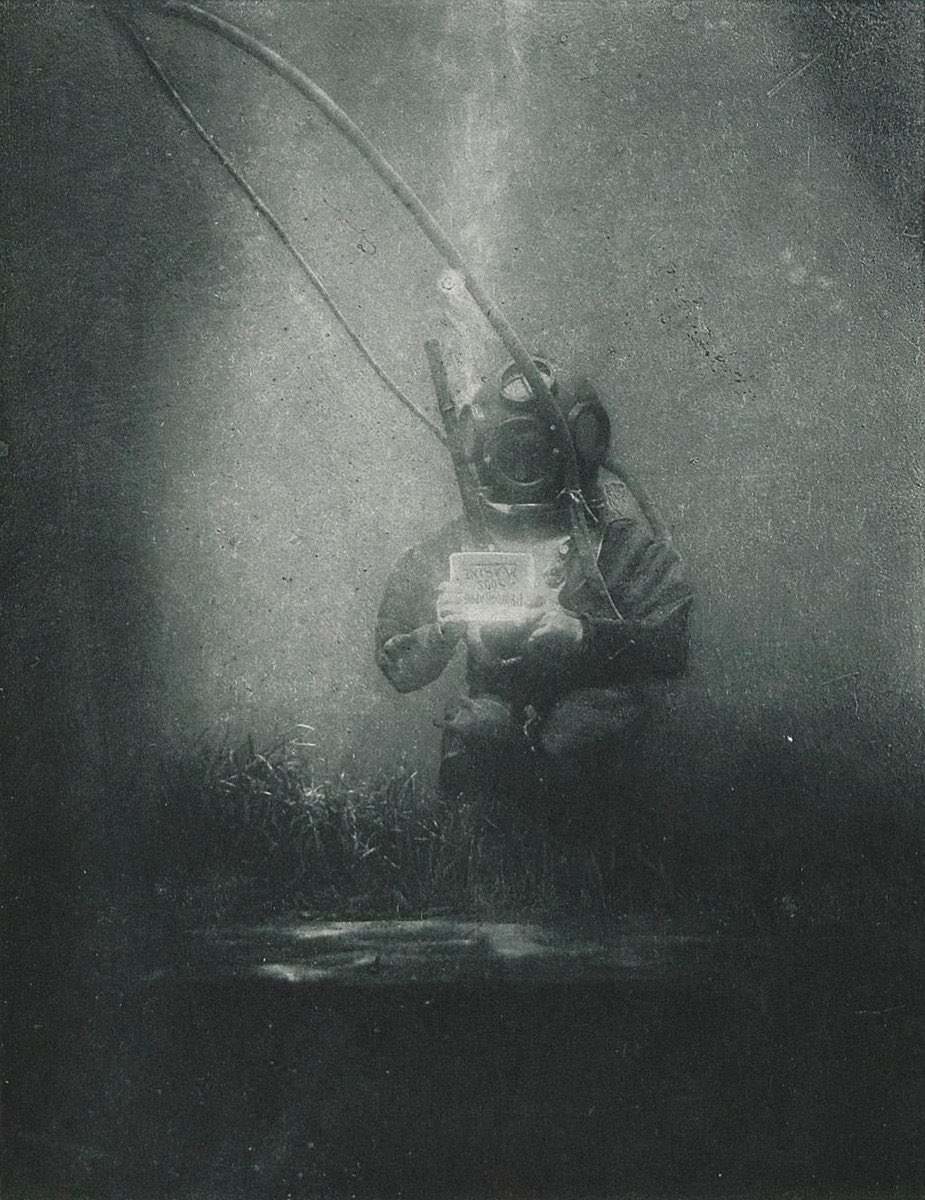
The image above may at first look like a plate from a Jules Verne novel, or perhaps a still from one of Georges Méliès' more fantastical moving pictures. It does indeed come from fin de siècle France, a time and place in which Verne, Méliès, and many other imaginative creators lived and worked, but it is in fact a genuine underwater photograph — or rather, a genuine underwater portrait, and the first example of such a thing in photographic history. Taken in the 1890s (most likely 1899) by biologist and photography pioneer Louis Boutan, it depicts Boutan's Romanian colleague Emil Racovitza holding up a sign that reads "Photographie Sous Marine," or "Underwater Photography."

Such an outlandish concept could hardly have crossed many minds back then, and fewer still would have dreamt up practical ways to realize it. To start with the most basic of challenges, there is, as David Byrne sung, water at the bottom of the ocean — but not a whole lot of light, especially compared to the burdensome requirements of late 19th-century cameras. This necessitated the development of what Petapixel's Laurence Bartone calls a "crazy underwater flash photography rig," one powerful enough that it "could easily double as a bomb. The creation involved an alcohol lamp on an oxygen-filled barrel. A rubber bulb would then blow a puff of magnesium powder over the flame, creating a flash."
Photography enthusiasts will understand the magnitude of Boutan's achievement (made with the help of his brother Auguste and a laboratory technician named Joseph David). Some have gone so far as to recreate it, an effort you can see in the Barcelona Underwater Festival video just above. Not only are there fish and other sea creatures swimming everywhere, a feature of the environment not visible in Boutan's original shot, but the re-enactors face the pressure of curious passersby, young and old, who walk through a nearby transparent underwater tunnel, not a consideration for Boutan and his collaborators. That groundbreaking success in underwater portraiture came 54 years after a Philadelphia chemist named Robert Cornelius first turned his camera on himself. Has photographic history recorded how long it took humanity after Boutan's famous picture to snap the first underwater selfie?
via Diane Doniol-Valcroze on Twitter
Related Content:
Underwater Volcanic Eruption Witnessed for the First Time
Reef View: Google Gives Us Stunning Underwater Shots of Great Coral Reefs
Sunken Films: Watch a Cinematic Meditation on Films Found on the Ocean’s Floor
See the First “Selfie” In History Taken by Robert Cornelius, a Philadelphia Chemist, in 1839
The History of Photography in Five Animated Minutes: From Camera Obscura to Camera Phone
Based in Seoul, Colin Marshall writes and broadcasts on cities, language, and culture. His projects include the book The Stateless City: a Walk through 21st-Century Los Angeles and the video series The City in Cinema. Follow him on Twitter at @colinmarshall, on Facebook, or on Instagram.
Behold the First Underwater Portrait in the History of Photography (Circa 1899) is a post from: Open Culture. Follow us on Facebook, Twitter, and Google Plus, or get our Daily Email. And don't miss our big collections of Free Online Courses, Free Online Movies, Free eBooks, Free Audio Books, Free Foreign Language Lessons, and MOOCs.
from Open Culture https://ift.tt/2FuARMB
via Ilumina
Comments
Post a Comment